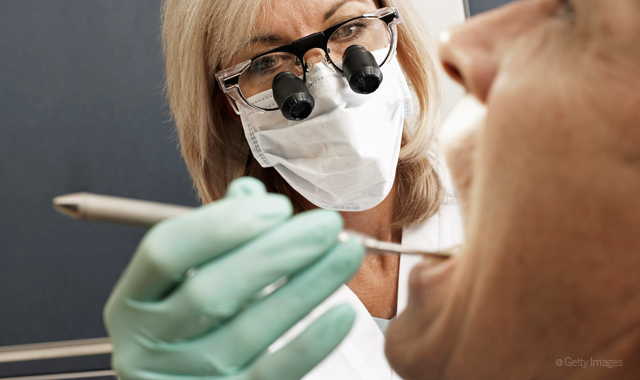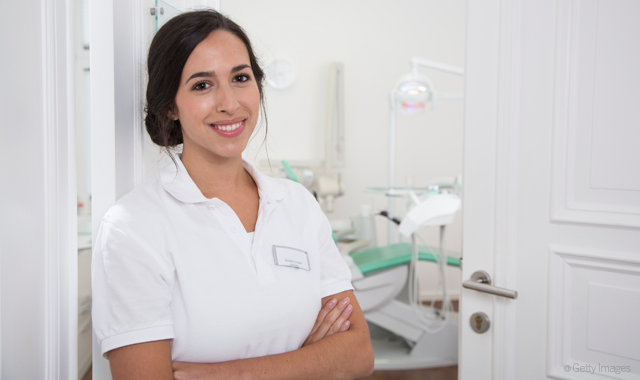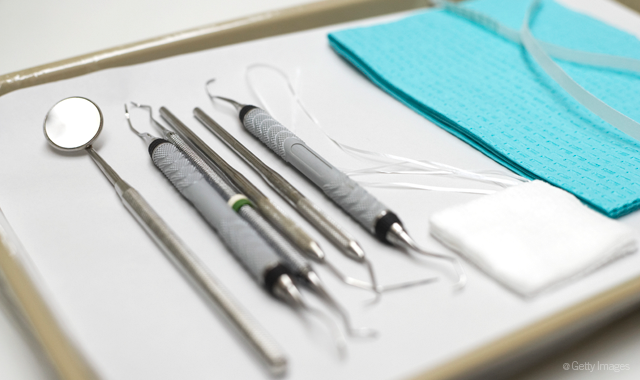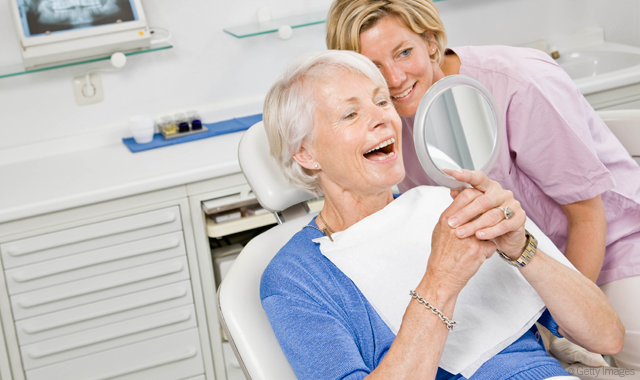5 interesting questions dental hygienists asked Kara RDH in December
As a well-known and accomplished dental hygienist, Kara Vavrosky often gets asked for advice. Here, Vavrosky shares five more interesting questions she's ben asked, along with her answers.
As a well-known and accomplished dental hygienist, Kara Vavrosky often gets asked for advice.
She runs the popular Facebook page Dental Hygiene with Kara RDH and is also the founder of dentalhygieneanswers.com, a question-and-answer platform for dental hygienists.
Here, Vavrosky shares five more interesting questions she's been asked, along with her answers.
Continue to the next page to view our slideshow of these questions and answers.




Should I still be getting paid if there is an insurance screwup and the office doesn’t get paid?
I am a hygienist working extremely part-time in a new practice due to its gaining patient base. Currently, I am receiving commission for pay, but receiving a base per patient until insurance rolls in and I surpass what I’ve been paid and am able to start seeing my commission. Since I’m not salary or hourly, I’m only commissioned on what insurance pays (if they pay). We’ve had cases where there was a mix-up with insurance and we did not take theirs as well as an S&RP of all four quads that insurance would not pay so it was all written off. This leaves me with having done a lot of work, but not receiving a dime for it. Is this fair? Should I be requesting some kind of pay for it?
Also, there has been a tremendous amount of no shows. Should I be getting some kind of pay for these since I did my part and showed up, confirmed appointments, etc.?
Wow, unbelievable! First, who is the person who is in charge of patient’s insurance and doing the insurance breakdown? If it’s not you, then YOU should not be “punished” for THEIR (big) mistake. Coverage should be checked before the patient even sits in the chair! So in my opinion, doing any work (especially SRPs) should be compensated and no it’s not fair that you aren’t. The Fair Labor Standards Act, which is Federal law, states that any work done on behalf of your employer must be compensated at or above minimum wage. Of course I believe you deserve more than minimum wage, but that’s just what the law says. So this almost makes me wonder if a Federal law is being broken here… Further, commission structure should not be based on collections, but what is billed in the first place. You should be making commission on the work done. It’s not in your control what the insurance pays.
Regarding the no shows: I wonder why there are so many no shows. Do you have an office policy that patients sign stating that after so many no shows they will be charged a no-show fee or even released from the practice? Also, are these recall patients not showing up or new patients? If its recall patients, then something is going on there. Whether it be a patient care issue, front desk issues, whatever, finding out why this is happening, so it can be fixed, should be number one. I have heard of some offices making the hygienist clock out if there is a no show, however I think if you remain busy stocking, sharpening, even filing, I believe you should be paid for the same reasons I stated above.
If these things continue to be a problem, honestly, I would look for another office to work for. I know that’s hard, especially since you are only working part time right now and are probably looking for a full-time job anyway. On the bright side, if and when the patient base grows in the practice getting paid on production can be extremely lucrative.
I hope I was able to help at least a little, and best of luck going forward!



When the doctor doesn’t make referrals…
One of my perio patients came in for her three-month maintenance appointment. A 51-year-old female with insulin-dependent diabetes. I noticed a small black area on her tongue that had not been there previously. It was jet black, 2 x 2 mm, slightly raised. It was not consistent with the surrounding tissue. It actually looked like a piece of something burnt sitting on the side of her tongue. I thought that she should be referred to an oral surgeon immediately for a biopsy, but the doctor told her we would reevaluate at her next appointment. Am I overreacting? If it was on my tongue I would have made an appointment right away.
This same patient has severe perio: 9, 10, 11+ mm pockets, many mobile and drifting teeth. After completing the initial SRP, I asked the DDS about referring to a periodontist. He said he didn’t think they would be able to help her. We are not helping her either! She has pockets that I cannot clean adequately. She has third molars that make cleaning even more difficult. At this last appointment, I told her to look into seeing a periodontist to see if they have other options for her despite the doctor not wanting to refer her. Am I wrong? Even if they can’t do anything for her at least she will know she did everything she could.
In my opinion, you are not overreacting and you are not wrong! As you probably know, if a lesion does not clear-up within two weeks, it’s time for a referral for a biopsy. If the lesion is cancerous, waiting until the patient’s next appointment could be too late. Cancer can turn from stage 1 to stage 4 or worse, quickly. Unfortunately, I know this from experience. While not oral cancer, this happened to my dad. He was deemed cancer free, but started to have pain. The oncologist told him “it was nothing” and gave him vicodin for the next 3 months. At the 3 month mark the doctor said, well we have been “watching an inflammation.” We immediately went to a different doctor. The new doctor said this is not an “inflammation,” it is now stage 4 cancer (after comparing the CT scans). My father passed within months. I tell you this to assure you that, again, you are not over-reacting. In my mind it is neglect to “watch” a lesion. It is also the dentist’s duty to provide the patient with all treatment options (PARQ).
Regarding a referral to a periodontist – it is not the dentist’s place to decide what a periodontist can or cannot do. Those pockets started as 5 or 6 mm and if the patient was referred then she may not be in the shape she is now. I refer to a periodontist for pockets over 6 mm because our instruments simply cannot adequately reach much deeper. Some may not agree, but I would have told the patient, that if it was me, I would see a periodontist and an oral surgeon even if the dentist doesn’t agree because I need to sleep at night! I would also chart like crazy exactly what the dentist is recommending or not, to cover your license. By not referring, your doctor is not only doing a disservice to the patients, but is setting himself up for a lawsuit. This situation makes me so sad because patients put their trust in healthcare professionals and to not make proper recommendations is so very wrong, morally and ethically. Frankly, I wouldn’t feel comfortable working for a dentist like that. This is a tough situation, do what you feel is right; as someone must stand up for the patients. I wish the best of luck to you!



Starting at your first office
I am beginning my first career at a small private office. Was wondering how everyone else’s first day on the job compares. There is a new computer system I am getting used to. I manage to schedule my own appointments when I am not far behind. My first full day I walked out 30 minutes late. The doctor and the other hygienist both left.
Now I hold myself to a high expectation. I want to make sure the doctor is satisfied with my work. I fell behind on charting and my notes because I still feel uncomfortable with the computer system. How do you go about feeling comfortable in your office and keeping the team happy by staying on time as a newbie?
First and foremost, a big congratulations on landing your first job! Feeling comfortable in a new office is simply a matter of time. I’m very impatient and somewhat of a perfectionist, so this has always been hard for me. I wanted to be perfect right from the start, much like it sounds you do! Be patient with yourself and don’t be too hard on yourself while you are learning. It may take a couple months for you to feel secure. After every day though, you will notice that you are finding your routine and things are running smoother and more on time.
Give yourself a good few weeks to feel comfortable with the computer system. It will slowly become like second nature, but again, there’s that having patience thing! In my opinion, on your first day, only being 30 minutes behind isn’t too shabby! However, it is kind of icky that someone didn’t stay to make sure you didn’t have any questions. On the topic of questions, don’t be afraid to ask them! This is how you learn; it also shows the team you are making an honest effort to be a part of the team. Also, let’s say you need to know where something is in the office – instead of asking someone to go get it for you, ask where it is located and get it yourself. This shows you are trying to learn and that you are self-sufficient to boot. I like to recommend learning the “sterile routine” as soon as possible because being able to throw in a helping hand when you can by sterilizing instruments is a help to all.
If you are up for constructive criticism, ask your doctor or co-workers how you are doing; like if there’s something you should change or aren’t doing quite right (how the office likes it), or even if they have any tips with the computer or how to be more efficient. In turn, your co-workers should be patient with you. They have been new before too and should remember it takes time. If you are showing honest effort in your learning and getting comfortable in your routine the team should be happy.



What is the current time given for basic prophys?
What is the standard time given in most general dental offices? The current practice was bought out and my one hour is being brought down to 40 minutes. How do I pace myself and still do a great job and not feel anxious?
Generally speaking, I feel the average time needed for an adult prophy is 50-60 minutes. Depending on the patient’s homecare, some hygienist can do it in less time. However, it is my personal opinion that anything less than that infringes on the standard of care. Even if you complete scaling faster, you still need time for a thorough review of health history, to go over OHI, explain any treatment needs, build rapport, etc. Personally, I wouldn’t work in an office that gives me less than an hour per patient because I am there to do a service for the patient and I have to sleep at night knowing I did so.
As far as pacing yourself, you can give OHI while scaling and keep the chit chat to a minimum, but the patients may notice that you are rushed. When appointment times are shortened, I wonder if the office really has the patient’s best interest in mind or are only concerned about the bottom line (money). As time goes by working in only 40 minutes, hopefully you can find your routine – it will just take time and practice to adjust.
If you feel you aren’t providing the best patient care you can, it may be time to speak to whomever made this change and express your concerns. I must be honest that your concerns may go unheard. If you begin to dread going in to work because of the anxiety, it may be time to move on from that office. Good luck, I really hope everything works out for you!


Frustrated and don’t know where to start
I recently started a mostly (three to four days a week) full-time position with an office. I’m a little concerned with starting out on the wrong foot concerning patient care and what I was taught in school and feeling like crap at the end of the day. When I accepted this position I was thrilled to have found my dream job so soon. The dentist’s main focus is patient education about periodontal disease. There were many promises about opportunities and room for growth.
Here is the downside:
1. My office does FMD and adult prophys with three to four months re-evals on new patients really needing SRP. The way my office does it, is upon comprehensive eval, if there are 4+ mm pockets in either quad both facially and lingually, the recommendation is SRP. Which is fine. But all of these patients get FMD or an adult prophy (whichever insurance with cover) before that SRP. In school I was taught that FMD can cause the pockets and tissue to heal basically trapping bacteria and toxins increasing the opportunity for abscess.
2. The hygienists see one patient per hour which is fine, but if I have a patient with little to no build-up, extremely good homecare, their cleaning is not going to take a full hour if all I am doing is an adult prophy and exam. The office manager has said I am getting done too quickly (45 minutes) and need to spend the entire hour cleaning. My thought process is do the cleaning and OHI, exam, then schedule the patient leaving five minutes for notes so I can start my next patient at their scheduled appointment time. Is this wrong? Right now, I have the front desk bringing my patients back to be seated sometimes 10-15 minutes before their appointment time while I’m still with another patient. It leaves no time in between to write up chart notes let alone a bathroom break.
3. Our office does laser therapy after SRP. Because I am not yet trained on this, I don’t get to do SRP unless a patient opts out of laser treatment. It’s frustrating because I feel like my tactile sensitivity is going to disappear. I’m not exactly sure where I’m supposed to have this growth if I’m not able to see challenging cases.
I want to give it some time. I really do, but, I just see all of these signs and flags telling me I should already start looking for something else. I’m supposed to be the main hygienist and yet I don’t quite feel that way yet.
Any suggestions or words or encouragement?
First, congratulations on finding a job! To address your concerns: I completely agree with what you were taught in school regarding FMD before SRP. FMD should only be done if the doctor cannot do a proper exam due to debris, plaque, calculus, etc. for the exact reason you stated (perio abscess risk). The patient should be treated due to need, not treated in accordance to what the insurance pays for. My suggestion would be to sit down with your doctor and express your concern about this risk. I would search online and print articles, studies, and even bring in your hygiene school books to back you up. When you explain, make sure your concern is for the patients and not just that the office protocol is wrong.
Concern 2: Again, I agree with you in that if the patient has great homecare and you finish in 45 minutes, then so be it. It’s not like you are finishing in 15 or 20 minutes. You absolutely need time for notes, turning your operatory over, etc. Personally, I’d rather run early than late because running late makes me a stressed out mess and the patients notice this. Further, the office manager should not be dictating patient treatment on any level (unless he/she is a licensed dental professional). Like your first concern, it may be something that needs to be addressed with the doctor. If the office manager doesn’t dictate time for treatment for the doctor, then they shouldn’t be doing it for you either.
Concern 3: I don’t think your tactile sensitivity will disappear due to not doing all SRPs, you are still scaling patients everyday right!? Are you scheduled for training on the laser yet? My suggestion would to be get on that right away.
Like you mentioned, I would give it time. Try to have a conversation with the doctor about your concerns and see if things change or at least get a bit better. If they don’t, and you continue to feel like crap at the end of each working day, then it may be time to make a decision. I feel I must mention that even perfect offices have a few downfalls; you just have to decide if these downfalls outweigh the good. I wish the best of luck to you!